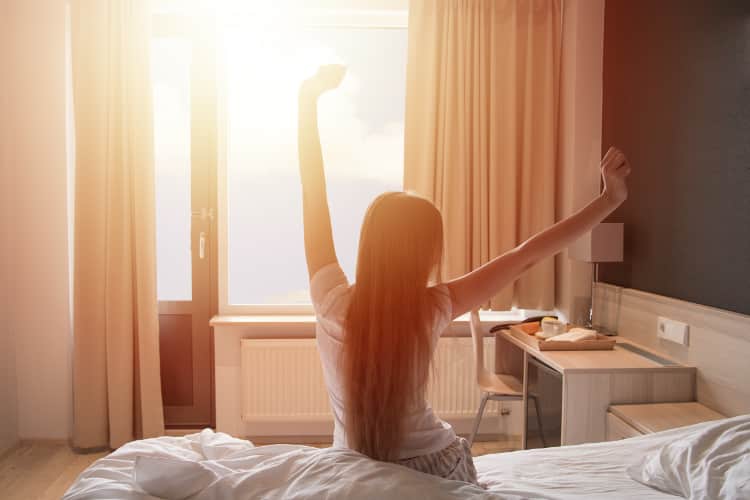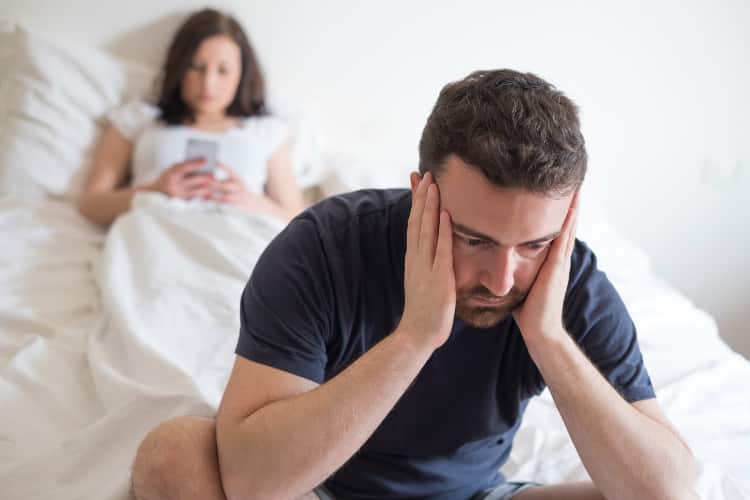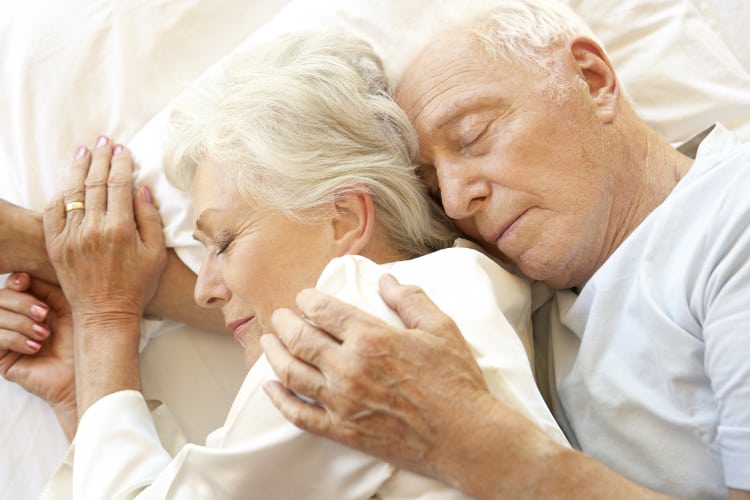What Is Sleep Hygiene? 11 Steps to a Better Night’s Sleep

Nothing is better than a good night’s sleep. But while we all wish we could sleep well every night, about 1 in 3 people suffer from mild to severe insomnia.
One of the leading factors that can cause insomnia is poor sleep hygiene.
Sleep hygiene refers to the routine you establish before bedtime, which can ultimately help you get a fuller, more restful night’s sleep. Not only will you sleep better, but practicing good sleep hygiene also improves concentration, performance, and decreases recovery time from stress and physical ailments.
If you’re having trouble falling asleep or staying asleep, there are simple, natural steps you can take to help promote healthy sleep cycles.
Here are 11 ways to improve your sleep hygiene so you can get a better night’s sleep.
1. Avoid screens at least 1 hour before bedtime
 Most electronic devices emit what is known as blue light. Blue light suppresses the brain’s production of melatonin, a hormone that helps you sleep.
Most electronic devices emit what is known as blue light. Blue light suppresses the brain’s production of melatonin, a hormone that helps you sleep.
By avoiding screens at least 1 hour before bedtime, you allow your brain to catch-up on its melatonin production. By re-establishing your melatonin levels, you are actively improving your sleep hygiene.
If you’re having trouble cutting back no screen time, try setting a timer 1–2 hours before bedtime as a reminder to turn off your electronic devices. You can also try ‘Swannies,’ which are orange-tinted glasses that block out blue light.
2. Sleep in complete darkness
The human biological timing process, known as the circadian rhythm, is profoundly impacted by light. When the human brain senses the presence of light, it starts waking up the brain. Making sure your bedroom is completely dark at night helps to turn off the brain. You can do this even in normally bright areas or times of day by using blackout curtains or an eye mask (sleep mask).
Many electronic devices also emit small lights when they’re plugged in or charging, which can be enough to affect sleep patterns. Before you go to bed, try unplugging devices or covering remaining light with a small piece of paper or fabric.
Curious if hypnosis could help you sleep well?
Take our hypnotizability test and find out!
3. Avoid alcohol before bed
Drinking alcohol negatively affects your sleep cycles in two ways. First, you’re more likely to toss and turn throughout the night. That’s because alcohol makes achieving REM sleep more difficult. Second, you may wake up in the middle of the night needing to use the bathroom. When falling asleep is hard enough, the last thing you need is to have to do it twice a night.
Avoiding alcohol before bed makes it easier for your body to get the quality rest it needs.
4. Monitor your caffeine
 Studies have found that 85% of the U.S. population consumes at least one caffeinated beverage and an average of roughly 165mg of caffeine every day. While caffeine might help you wake up, it may also be impacting your ability to stick to a steady sleep schedule.
Studies have found that 85% of the U.S. population consumes at least one caffeinated beverage and an average of roughly 165mg of caffeine every day. While caffeine might help you wake up, it may also be impacting your ability to stick to a steady sleep schedule.
Monitor your caffeine intake throughout the day; this means tracking how many coffees, sodas or energy drinks you have and when. By tracking your caffeine intake, you can understand how the drug may be affecting your sleep and better manage your consumption.
5. Get regular exercise
Exercise is an important step you can take towards improving your sleep hygiene. Regular exercise has been found to reduce stress and regulate hormone levels, both of which impact the quality of your night’s sleep.
You might have heard that exercising too close to bedtime can make it harder to fall asleep. And while this can be true for some individuals, a 2011 study suggests strenuous exercise — even right before bed — has no impact on sleep quality.
It comes down to how your body responds to exercise. If a vigorous late-night workout is making it hard to sleep, try adjusting your schedule to finish exercising at least 2–3 hours before bed.
Establishing a regular workout routine like brisk walking, aerobic exercise, and yoga can all support better sleep hygiene and help you get a quality night’s sleep.
6. Manage sources of stress before bedtime
Stress and sleep don’t mix well. By managing sources of stress before bedtime, you can ensure that you are in a more relaxed state when you lie down.
Common sources of bedtime stress include watching the nightly news or action-packed TV shows, reading work emails, or even scrolling through Facebook or Instagram photos.
Try winding down with a good book or a favorite hobby 30 minutes before bed for a more relaxing, less stressful nighttime routine.
7. Manage your response to stress
Experiencing stress before bedtime is bound to happen occasionally. Luckily, you can manage your response to stressors.
If you feel overwhelmed or can’t kick racing thoughts, you can actively manage stress by practicing mindful meditation, taking a hot bath, trying progressive muscle relaxation techniques, box breathing, or listening to a sleep hypnosis audio.
Still can’t sleep? Instead of laying in bed feeling stressed, try getting up for 5–10 minutes and doing something outside of the bedroom. This will help you avoid associating sleep with stress, which can contribute to more consistent, higher quality sleep.
Remember, sleep hygiene is about self-care. And that means managing stress before bedtime.
8. Keep a regular sleep schedule
When trying to improve your sleep, consistency is essential. Going to bed and waking up at the same time every day helps sync your body’s circadian rhythm. When you keep a regular sleep schedule, you’ll feel not only more energized during the day but will sleep better at night.
9. Keep your bedroom cool
Keeping your bedroom cool promotes deeper more consistent sleep. According to a study by the University of South Australia, the body’s core temperature must drop in order for normalized sleep patterns to begin. If you suffer from insomnia, it could be in part because your body’s core temperature isn’t lowering enough (or quickly enough).
Getting into the habit of keeping your bedroom cool can help lower your body temperature and contribute to better sleep hygiene and higher quality sleep.
10. Watch your food timing
Right before bed, you should avoid eating a big meal or anything with high amounts of sugar. Eating too much (or the wrong foods) too close to bed can cause your metabolic and digestive processes interrupt the brain’s wakeful state as well as many other bodily systems.
Watch your food timing. Try not to eat a full meal within one hour of going to bed.
11. Eat a small snack containing protein and fat (like 6–10 almonds) before going to bed
If you often wake during the night and have trouble falling back to sleep, try eating 6-10 almonds at bedtime. Almonds and other foods containing protein and fat are metabolized slowly by the body, which can keep your blood sugar from dropping too low during the night. When your blood sugar crashes, your adrenal glands release adrenaline to compensate. And these night-time hypoglycemic events can make it hard to get a full night’s rest, especially if you experience a lot of stress or suffer from adrenal fatigue.
Eating a small snack of protein and healthy fat right before bed can help keep your blood sugar from crashing during the night. In addition, this small boost of protein can help with muscle recovery.
Improve Sleep Hygiene (Starting Tonight)
Following these 11 steps can lead to improved sleep hygiene and a better, more restful night’s sleep. By introducing these steps into your nightly routine, you can wake up feeling rejuvenated and improve concentration, performance, and recovery.
Want to learn more about improving your night’s sleep? Read our Sleep Hypnosis Ultimate Guide or check out our suggestions for How to Fall Asleep Fast.
Curious if hypnosis could help you sleep well?
Take our hypnotizability test and find out!


